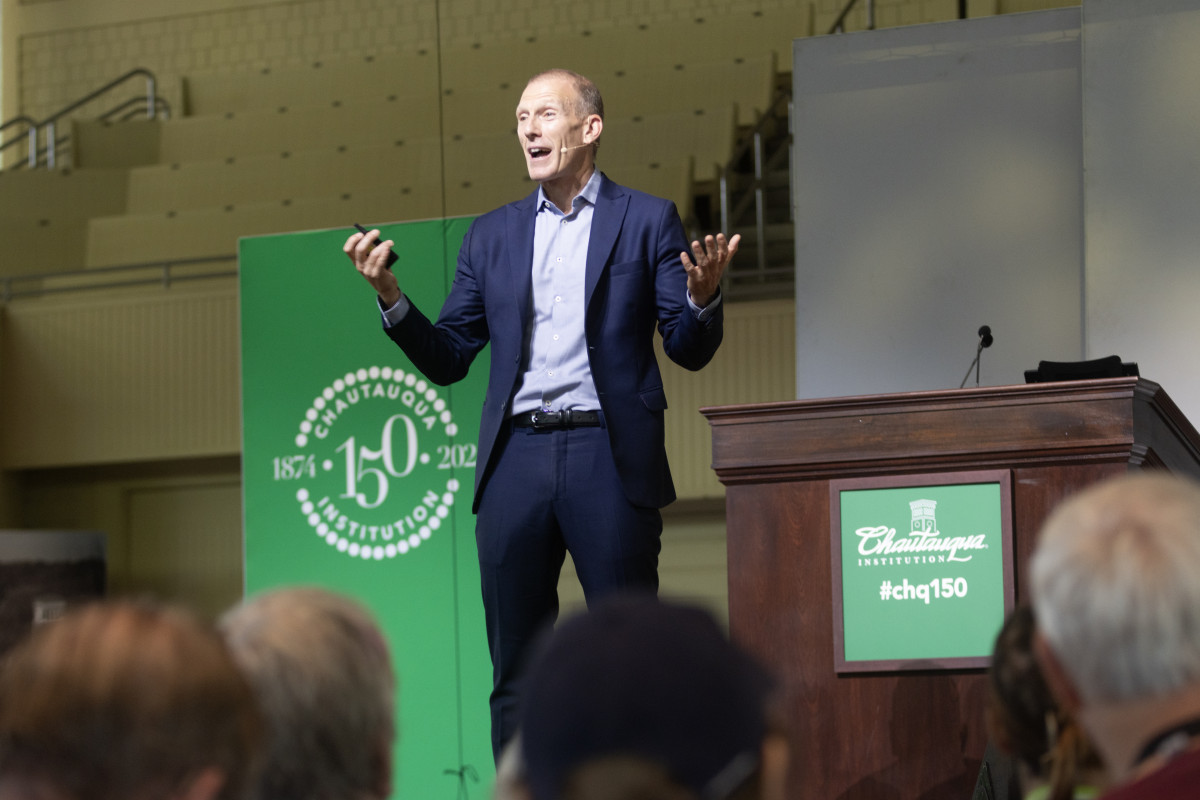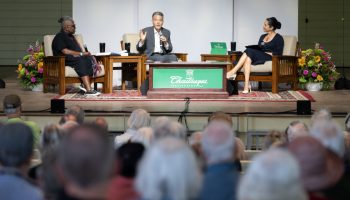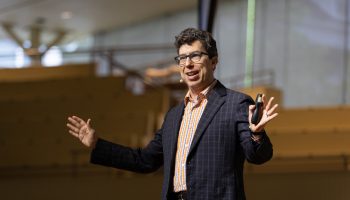
Futurist and healthcare expert Jamie Metzl speaks as a part of the Chautauqua Lecture Series Friday morning in the Amphitheater.
Technology does not come with its own built-in value system, Jamie Metzl said last Friday. It’s up to humans to weave their values into the technologies they create.
“That is the name of the game,” Metzl said last Friday morning in the Amphitheater, closing the Chautauqua Lecture Series Week Two theme of “The AI Revolution.” “If we do a good job, we get a good future; and if we do a bad job, we get a bad future.”
Metzl, futurist and author of, most recently, Superconvergence: How the Genetics, Biotech, and AI Revolutions Will Transform our Lives, Work, and World, discussed the rapid advancement of technology and the responsible deployment and integration of these innovations into society. Technologies from harnessing fire to farming — a radical, revolutionary advancement from hunting and gathering, Metzl said — are what created human civilization as we know it. In fact, it will be “very hard for AI to be as radical as farming was for our species.”
“That does not mean that it is not radical,” he said.
Metzl shared how his parents’ personal and professional experiences shaped his understanding of technology’s broader implications. He showed a picture of his father from a little less than two years ago, which was shortly after the elder Metzl had been diagnosed with stage four metastatic neural endocrine cancer. The first scans after the initial rounds of chemotherapy hadn’t slowed the cancer’s spread, and Metzl’s father wasn’t a candidate for radiation therapy.
This was all happening as Metzl was writing the healthcare portions of his book. Deeply invested in the future of healthcare and the future of cancer care, Metzl talked to his father’s oncologist.
“Although it wasn’t standard protocol, I insisted that we sequenced tumor cells to see whether there were targetable mutations,” Metzl said, and then take those cells, grow them into organelles, and test treatments.
It turned out, there were targetable mutations, “a mutation that was delivering the message to the cancer cells to keep growing. If we were to interfere with that cellular messaging, we could give another message to the cancer cells and give his body a chance to recover.”
The treatment was a risk, but it worked. He’s now in “very significant remission,” and Metzl’s family was able to take his father — a diehard Kansas City Chiefs fan — to the Super Bowl this year.
“I know there is stuff to be scared about” with new technologies like AI, Metzl said, but “these technologies are also about how we get more of the things that we want: How do we get more time? How do we unleash human potential?”
The stories about his parents aren’t just personal history, but “about the enduring values that guide us in harnessing the power of technology for the greater good.”
His latest book, Metzl said, isn’t about any one specific technology, but the convergence of multiple technologies.
“Every technology is embedded in every other technology,” he said. “You needed to have the agricultural revolution to have the civilization revolution. You need the civilization revolution to have writing revolution. … With the computer revolution, you get the machine-learning revolution, and (then) the AI revolution.”
He continued: With AI, humans can looking more deeply at the natural world, understanding billions of years of “evolutionary wisdom,” in turn using that knowledge to create even stronger computer chips, which in turn speeds up the growth of AI.
“It is a loop of innovation and acceleration,” Metzl said.
One example, Metzl said, was that of DeepMind and its algorithm AlphaFold. Initially designed to play chess, AlphaFold and its successors were soon deployed to sequence proteins, condensing years of human work into just hours or days for the AI. This lets scientists focus on applying what the AI learns to bigger-picture solutions.
That’s just one company, looking at one problem, Metzl said.
“There are hundreds of thousands of other companies working on this same trajectory,” he said. “This speed and acceleration is not just this one company’s acceleration — it is all of our acceleration.”
Metzl underscored the critical need for comprehensive data in personalized, precision healthcare. Beyond genome sequencing becoming a routine part of electronic health records, understanding interactions among various biological systems — such as metabolism and genomics — is essential for advancing from personalized to predictive and preventive healthcare.
These tech “superconvergences” extend beyond healthcare, he said, and into the agriculture and energy sectors.
“This is about humans renegotiating our relationship with the living world more broadly,” Metzl said.
By leveraging biotechnological innovations such as genetically modified crops and sustainable energy sources, humanity can address pressing global challenges like food security and climate change.
“Using the same capabilities, not just AI, but the intersection of AI and genetics, and we allow these plants (like corn) to grow, to be more productive,” Metzl said. “We can grow in parts of the world which are becoming increasingly inhospitable as a result of climate change.”
With advancement in technologies like genetic engineering and synthetic biology — although, he doesn’t like that term, Metzl said — we can redefine how industries produce materials sustainably. For instance, genetically modifying organisms to produce spider silk — a material stronger than Kevlar — opens new avenues for textiles, medical applications and beyond.
Our brains, Metzl pointed out, are roughly the same size as our ancestors, tens of thousands of years ago. In 2024, humans are not smarter, per se, but they are the “beneficiaries of our collective cultural inheritance.”
“In many ways we are a hive species and this is our collective knowledge,” he said. “And the issue is, the challenges that we are creating — more data every two years than all of human history up to that point — and we are doing it over and over and over again. … How can we think differently?”
Nature has already solved this data problem, he said, over the course of 3.8 billion years. DNA is the greatest storage mechanism in history, so imagine a whole new field of DNA data storage — of digitized genetic information that can be stored for up to 5 million years in the right conditions.
“We can really think about preserving our cultural inheritance as a species,” Metzl said. “Oh, there is a problem. And the problem has just one name: Humans.”
Human competitiveness is a great strength and a great weakness; to put it in a different context, Metzl said, Darwin talked about evolution as random mutation and natural selection — “We are different and we compete with each other and that pushes everything forward and that is for better and for worse.”
Metzl discussed human genome editing and CRISPR, and how “there will come a time, and maybe not in the distant future, where we are going to want to make these kinds of changes, perhaps in the earliest cases, to change somebody’s life trajectory from may be four or five painful years followed by death, to 90 or 100 years of life.”
Every technology, in every instance, for all of time, can be used for better or for worse, Metzl said. The COVID-19 vaccines are a medical marvel, for example. But Metzl is also head of the Commission on China and COVID-19, and the findings of that commission are that “based on the preponderance of available evidence, we believe the Chinese government is primarily responsible for the COVID-19 pandemic,” he said. “Not just for the initial spillover, the however the initial spillover happened, it was the massive cover-up in the early days which allowed a kitchen fire, a stove fire, to become a global inferno.”
The Chinese government, Metzl said, destroyed samples, hid records, imprisoned journalists and placed gag orders on scientists. In short, “they have done everything possible for more than four years to block any meaningful international investigation.”
“We are saying there should be liability, but it is very difficult to hold China liable” because of the Foreign Sovereign Immunities Act, so Metzl is proposing a single-paragraph amendment, calling for a change to that law.
“In the case of a global pandemic, where more than 1 million Americans are killed, where the pandemic stems from the direct or indirect action of a state, when that state has prevented any kind of unfettered investigation, the United States will have jurisdiction,” Metzl said.
If we want the kind of world where governments are held accountable, where climate change can be solved, where big, intertwined problems can be addressed holistically, we have to build it. The future does not belong to humans alone or AI alone, Metzl said, but humans alongside AI.
“If you do not know where you are going, if this is a conversation about technology, we are going to get lost; if it is a conversation about human values and how they can be realized, that is the conversation that we need to have,” he said. “Because, our species, we are giving ourselves powers that for millennia we have attributed to our various gods — powers to create life, to extend life, to transform life, to build all kinds of new and wonderful things. But if we do not make sure that our greatest and most cherished values guided the application of our most cherished technologies, we are going to get lost.”




